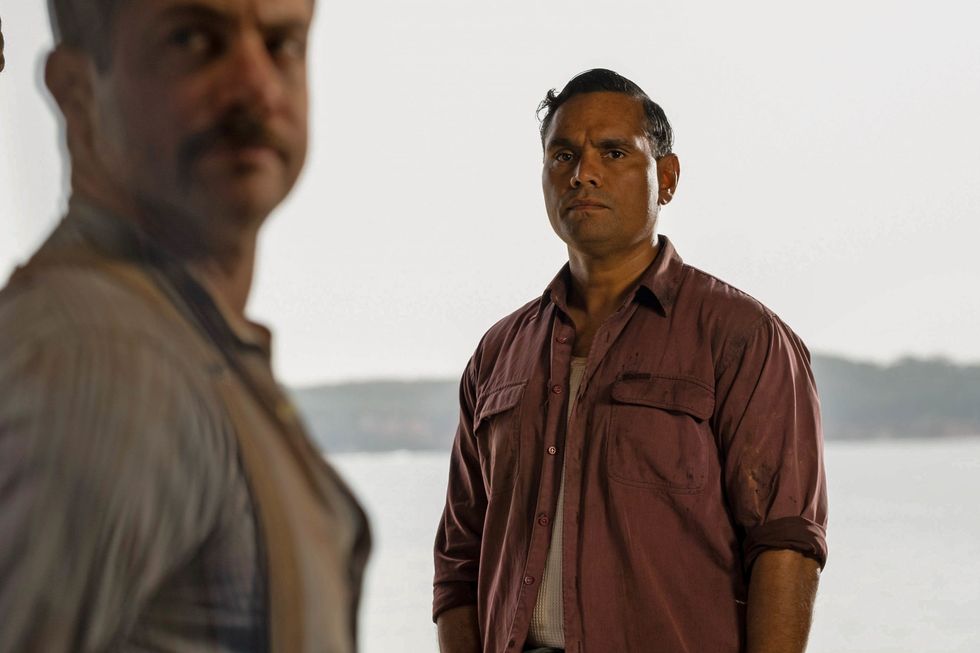NHS doctors and nurses, who are not getting the salary rises they think they deserve – and I am, like most of the public, sympathetic to their cause – are threatening to quit Britain for the sunny beach life of Australia where their wages will apparently double overnight. There are ads in the British Medical Journal offering doctors a six-figure salary and 20 days off each month to “travel, swim and surf in the sun”.
But, is leaving multicultural Britain wise? I pose this question because a new six-part BBC TV drama, Ten Pound Poms, portrays Australia as a singularly unattractive and deeply racist country.
In 1956, white British families were lured to Australia by promises of a sunlit paradise. But when they got there, they found that instead of the pretty homes featured in the misleading ads, they were thrown into Nissen huts (semicircular corrugated iron prefabricated shelters) which were stiflingly hot and full of cockroaches and other creepy crawlies.
In the TV drama, one new arrival describes the accommodation as resembling a “prisoner of war camp”.
Adults were charged £10 (£450 in today’s money) to make the journey half way across the world. On arrival they had to surrender their passports for two years. If they still wanted to come back, they had to pay a fine equivalent to £5,000.
In the real world, 1.2 million Brits signed up for the “Assisted Passage Migration Scheme”, created in 1945 by the Ben Chifley government and its first minister for immigration, Arthur Calwell, as part of the “Populate or Perish” policy. It was intended to substantially increase the population of Australia and to supply workers for the country’s booming industries.
The TV drama follows the fortunes of the Roberts family from miserable post-war Stockport – husband Terry (played by Warren Brown), his wife Annie (Faye Marsay), and their teenage daughter Pattie (Hattie Hooks) and young son Finn (Finn Treacy).
Terry, who is a qualified builder, is given the chance of digging ditches so long as an Australian doesn’t want the job. He is banned from the outdoor lavatory at work because that is reserved for Australians. He is told to use the bush. When the Brits complain of the conditions, they are dismissed as “whinging Poms”. One Australian psychopath tells Terry: “You have blacks in Britain, don’t you? Well, over here, you’re the black.”
When the man knocks down an Aboriginal youth while driving at night without lights, he leaves the victim lying in the road because the latter is not considered worth saving.
In fact, on arrival, we see one dark complexioned person taken away by unfriendly immigration officers who say Australia admits “whites only”. On another occasion, when Annie ventures into a department store in town, she is visibly shocked when an elderly Aboriginal woman is told by the shop assistant to return to the back of the queue.
The TV drama is written by an English writer, Danny Brocklehurst, who said in one interview: “Australia was advertised as sunny and optimistic, but when the Ten Pound Poms got there, they were treated as second-class citizens.”
One reviewer noted: “Racism looms large, mostly directed at the Aboriginal Australians who are considered by some to be little more than vermin.”
The drama, which has probably taken some artistic liberties, but is said to be historically accurate, is set in 1956. Surely it’s a different Australia in 2023? However, a recent survey found that 75 per cent of Australians hold an implicit bias against Aboriginal and Torres Strait Islander peoples.
Before booking a ticket to down under, NHS doctors and nurses intending to quit Britain should perhaps watch Ten Pound Poms.







 Naeli and the secret song
Naeli and the secret song








 Jamie Lloyd’s Evita with Rachel Zegler set for Broadway after London triumphInstagram/
Jamie Lloyd’s Evita with Rachel Zegler set for Broadway after London triumphInstagram/
 A compelling premise, layered and unpredictable charactersAMG
A compelling premise, layered and unpredictable charactersAMG Anyone who enjoys a gripping story with a diverse cast and unexpected twistsHarperFiction
Anyone who enjoys a gripping story with a diverse cast and unexpected twistsHarperFiction
 The Story Teller by Ley Roberts
The Story Teller by Ley Roberts Summer Exhibition coordinator Farshid Moussavi, with Royal Academy director of exhibitions Andrea Tarsia in the background
Summer Exhibition coordinator Farshid Moussavi, with Royal Academy director of exhibitions Andrea Tarsia in the background An installation by Ryan Gander
An installation by Ryan Gander A sectional model of DY Patil University Centre of Excellence, Mumbai, by Spencer de Grey
A sectional model of DY Patil University Centre of Excellence, Mumbai, by Spencer de Grey Rituals and Identity and Theatre of Resistance by Arinjoy Sen
Rituals and Identity and Theatre of Resistance by Arinjoy Sen
 An explosive new play that fuses biting satire, history and heartfelt storytellingPleasance
An explosive new play that fuses biting satire, history and heartfelt storytellingPleasance